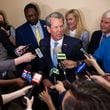Gov. Nathan Deal announced Monday that he was suspending collection of the state sales tax on jet fuel, keeping a promise to Delta Air Lines and other companies that the General Assembly rejected during the politically charged 2018 legislative session.
The state sales tax on jet fuel, which brought in $39 million in the recently completed fiscal 2018, will no longer be collected, starting Wednesday. The tax break, and an earlier decision not to collect local jet fuel taxes, could save Delta about $40 million a year.
The 2019 General Assembly, which convenes in January, will decide whether to bless that decision or reinstate the tax. Deal cited the same code section to suspend the jet fuel tax that Gov. Sonny Perdue used to stop motor fuel taxes from rising at the start of the Great Recession.
The code section states, “The Governor may suspend the collection of taxes, or any part thereof, due the state until the meeting of the next General Assembly but no longer; but he shall not otherwise interfere with the collection of taxes.”
Deal said the sales tax puts Georgia at a disadvantage, since many other states don’t charge such a tax on jet fuel or charge less. He said Georgia’s jet fuel taxes were the fourth-highest in the country among states with major airport hubs.
“In order to remain the No. 1 state in which to do business, attract more companies to our communities and provide more jobs for our growing population, it is crucial to maintain and preserve a pro-business climate,” he said. “Providing tax relief to job creators will help us maintain our competitive advantage as a global hub for commerce now and in the future.”
The General Assembly appeared poised to eliminate jet fuel sales taxes until Delta broke ties with the National Rifle Association, a move guaranteed to cause trouble in an election year.
Delta — by far the biggest beneficiary of a tax break on jet fuel — announced it was ending discounted rates for NRA members after the mass shooting Feb. 14 at a Florida high school.
Within two days after Delta’s announcement, Lt. Gov. Casey Cagle, the Senate’s president and a leading Republican candidate for governor, vowed to strip the jet fuel provision unless the Atlanta-based airline restored ties with the NRA.
Delta's move infuriated some conservatives and prompted each of the leading Republican candidates for governor to oppose the tax exemption for jet fuel. In the end, the Legislature killed the tax break in a matter of days.
Cagle was beaten in last week's GOP gubernatorial runoff by Secretary of State Brian Kemp.
With Deal's blessing, the state earlier this year suspended the collection of local sales taxes on jet fuel.
The Deal administration said federal law prohibits jet fuel sales taxes from being used for anything other than airport improvements, something that hasn’t necessarily happened at airports such as Hartsfield-Jackson International Airport.
Kemp, who earlier opposed the tax break, changed his tune Monday.
“We can only have one governor at a time and I trust Governor Deal to make wise decisions that put hardworking Georgians ahead of the special interests,” Kemp said in a statement. “I support economic incentives that generate a sizable return on investment for Georgia taxpayers and create economic opportunities for communities throughout our state. Based on the information provided, the governor’s executive order aims to do both.”
Democratic gubernatorial nominee Stacey Abrams said her primary concern was about the exemption’s impact on Clayton County, where Hartsfield-Jackson is located. Lawmakers approved money in the state budget this year to mitigate the fiscal impact on the county.
“I look forward to better understanding how this exemption benefits Georgia workers, including the employees of Delta and the Hartsfield-Jackson International Airport,” Abrams said. “If it leads to expansion of routes and deepening of investment, then the exemption fits within my framework for smart tax programs.”
Some lawmakers who opposed eliminating the jet fuel tax were surprised by Deal's decision. House Speaker David Ralston, R-Blue Ridge, declined to comment.
State Sen. Jen Jordan, D-Atlanta, said Deal was "sending a message to prospects like Amazon that Georgia will not bully or punish a business for following its own corporate values."
“The suspension is appropriate and, frankly, illustrates why Deal is the most popular elected official in Georgia right now,” she said. “Compare that to Kemp’s MAGA-themed approach that is already doing immeasurable harm to the state’s economic development effort.”
Business groups applauded Deal’s decision.
“Governor Deal’s executive order strengthens the competitiveness of Georgia’s airports, one of our greatest economic development assets,” said Hala Moddelmog, the president and CEO of the Metro Atlanta Chamber. “This will bolster our chances of attracting new direct flights and maintaining existing routes. Governor Deal has demonstrated once again why Georgia is the best state in the nation in which to do business.”
Delta thanked Deal for “his steps to ensure that the state of Georgia will remain competitive in the global economy.”
“The savings will allow us to invest additional flights into Georgia in the years to come,” Delta CEO Ed Bastian said. “We look forward to continued growth of our service in Georgia and the job creation that will accompany it.”
Southwest Airlines and Allegiant Air also put out statements applauding Deal’s move.







